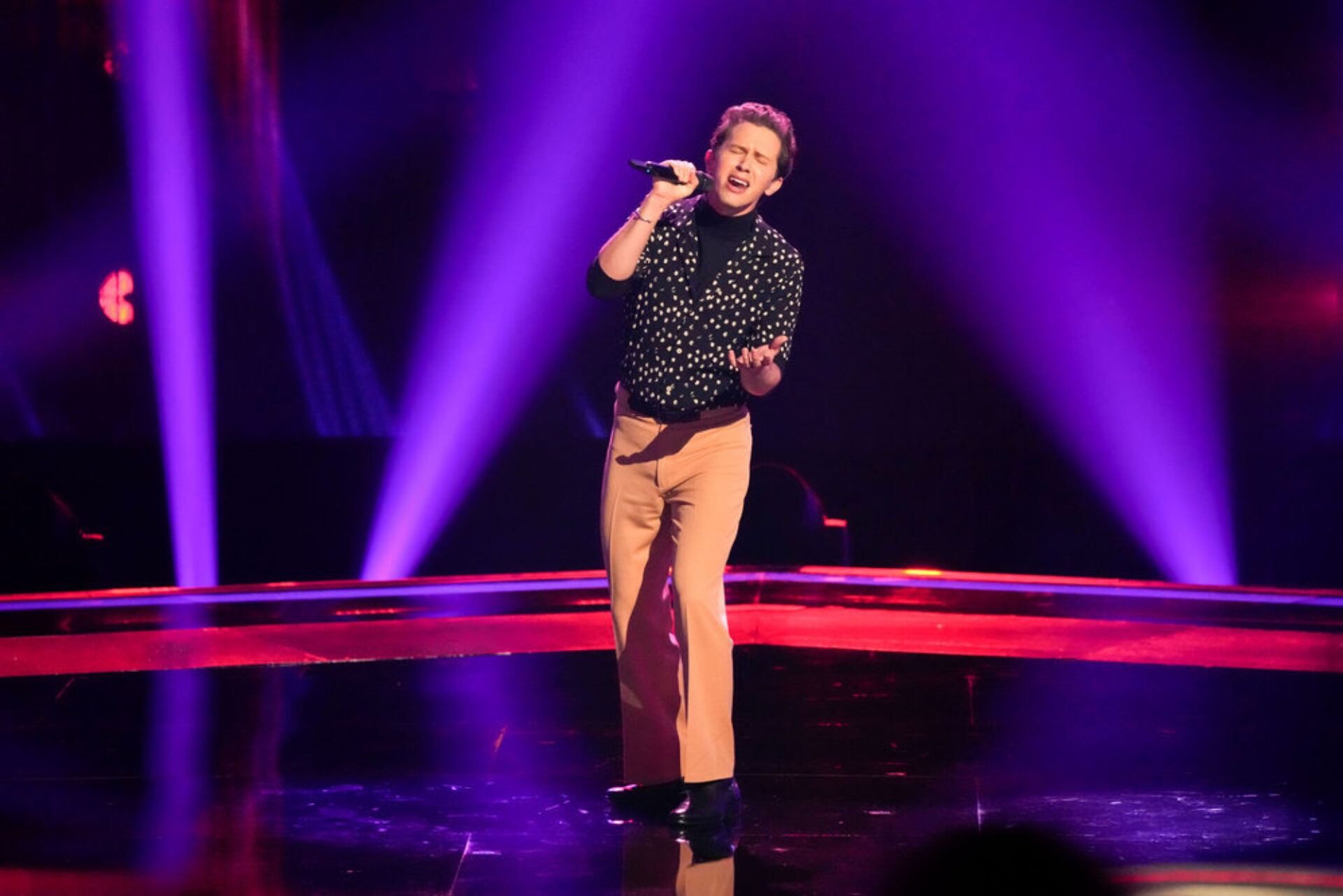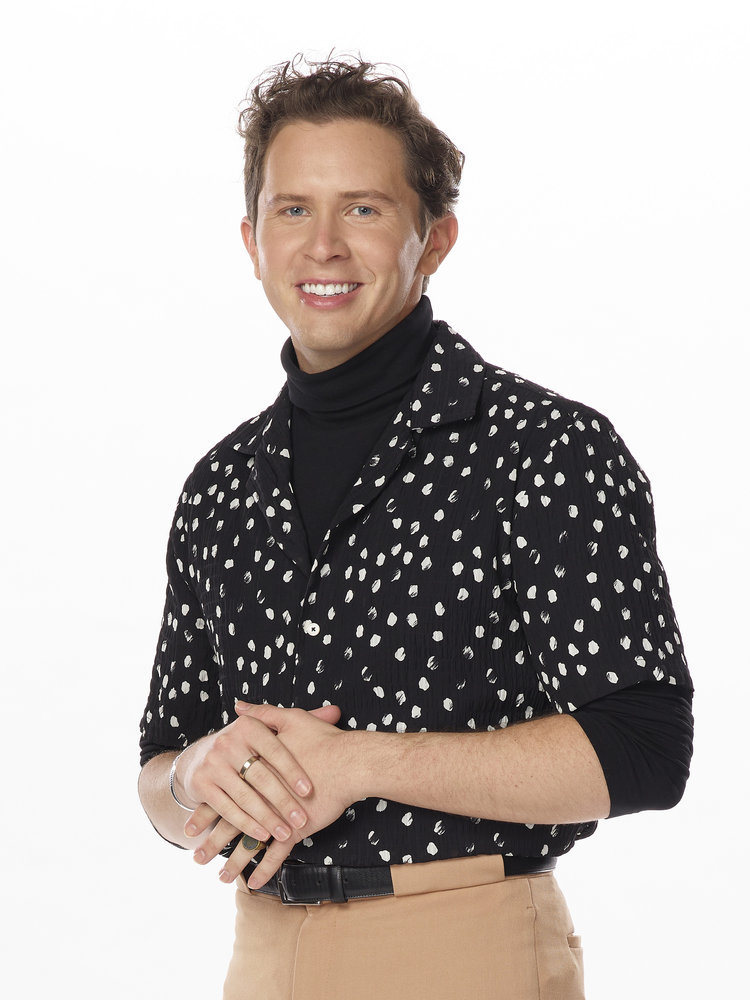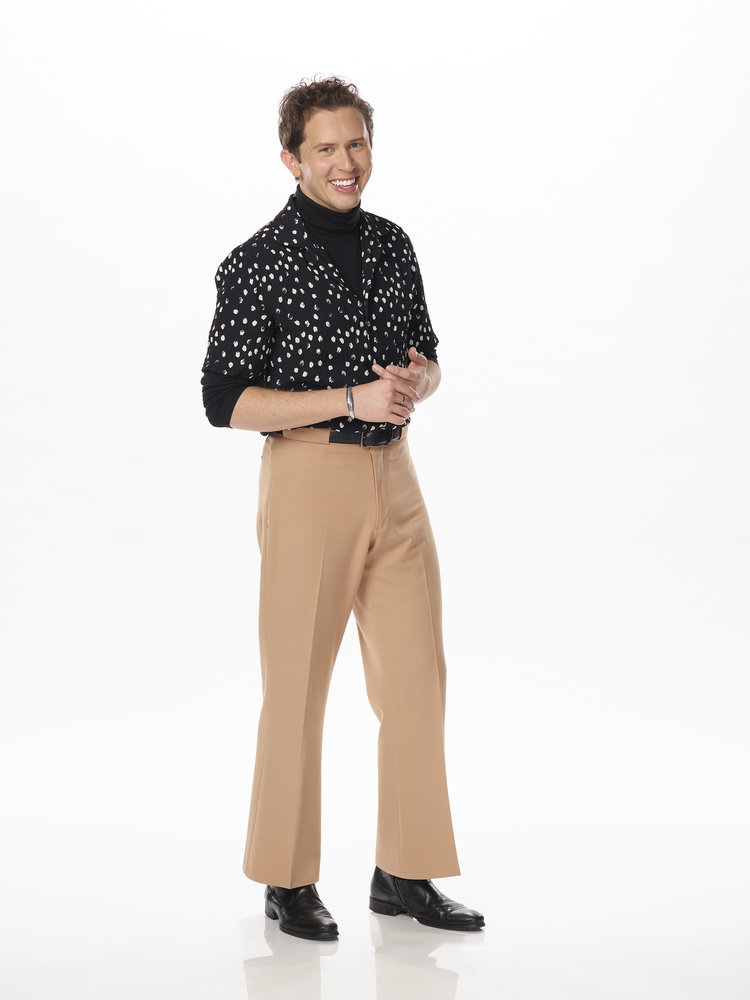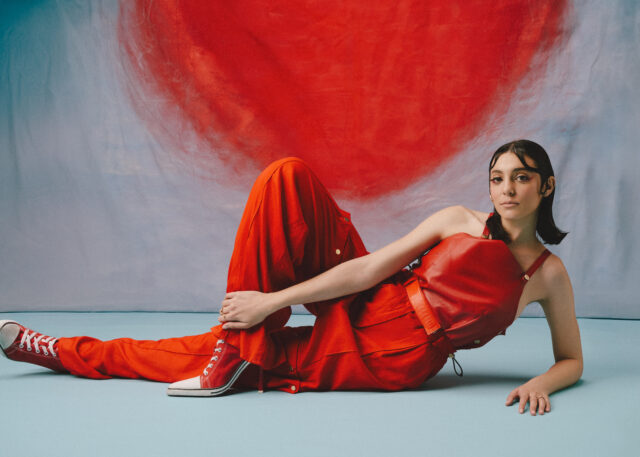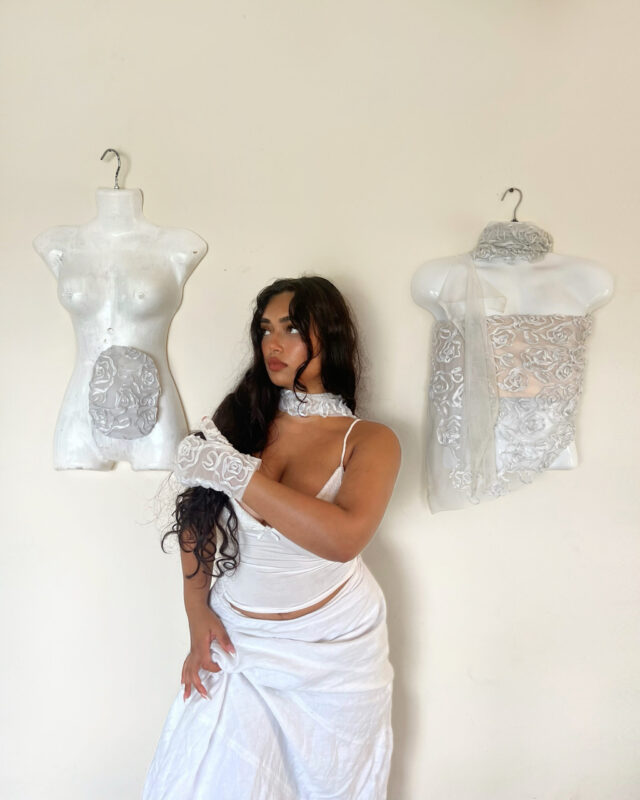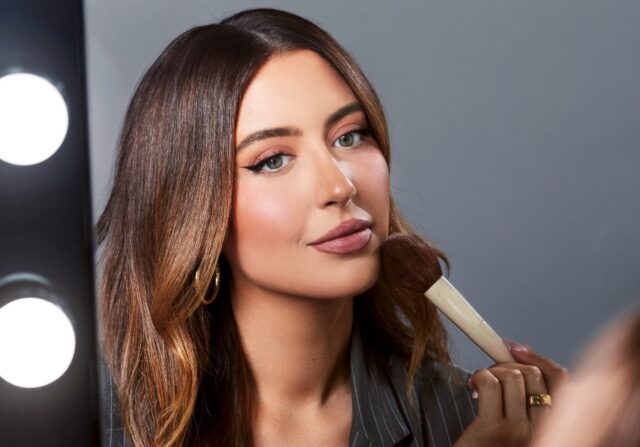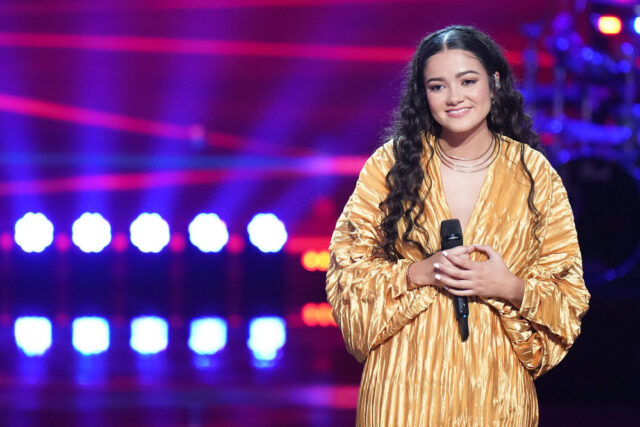INTERVIEW: The Voice’s Michael B. on Pivoting Back to Music After Trying Something New
Season 23 of The Voice is shaping up to be a fierce one with contestants like Michael B. The Blind Auditions have officially concluded, and while the coaches are ecstatic with their teams, they will soon have to say goodbye to half of them in the Battle Round.
In the Battle Round, each coach will put two of their teammates against one another, and after they perform their duet, the coach will only be allowed to keep one artist. Unfortunately, the artist who didn’t make the cut will be sent home, but if they’re lucky, they can be stolen and placed on another coach’s team.
In this case, Michael B. from Team Niall won his Battle Round and garnered the excitement of all four coaches, despite only having one coach turn their chair for him in the Blind Auditions. Michael B. sat down with us at Glitter to discuss his early beginnings, career change, and return to music.
BRITTANY: Michael, thank you so much once again for chatting with us at Glitter today. How are you?
MICHAEL: I’m so good. Brittany, how are you? It’s wonderful to be here.
BRITTANY: I’m doing well. Thank you so much for speaking with us; it’s so great to have you.
MICHAEL: Happy to be here.
BRITTANY: So before we even get into your journey on The Voice, let’s talk a little bit about your musical journey. Where did you begin? What sparked that interest? You know, where did you start?
MICHAEL: I moved around a lot as a kid. My dad works for the airlines, so we bounced around from state to state, and I didn’t really do much before I got to, like, high school. And so when freshman year came around, and we moved from Arizona to Texas, and I went from like this 60-student charter high school to this mega, like, a massive Texas high school. “I was like. I’m going to join choir.” And so I just to try it because I, like, I didn’t really know, like, if I could sing. I was 15 at the time, and I, like, got into it, and I was and, you know, there were kids around me that were like, “Hey, you’ve pretty good voice.” And I was like, “Okay.” So I started taking lessons and then, you know, I just kept practicing, and I started to compete, you know, like, do vocal competitions and stuff. And that’s honestly where it took off because once we moved to Texas and I started doing choir, I mean, I was doing shows and, you know, back-to-back stuff.
BRITTANY: Yeah, I don’t know what, but here’s just something about that high school performing arts. Like when you get into performing arts in high school, there’s just like a pipeline from there, you know?
MICHAEL: Yeah, it’s like back to back to like, you’re always getting ready for the next musical, and it’s, you know, a blast.
BRITTANY: Yeah, for sure. Do you have a favorite memory? Maybe a favorite song that you did? Favorite musical?
MICHAEL: Oh, that’s a good question. The one that just popped into my mind. So I’m going to go with it. Yeah, I was, you know, in a vocal studio, and I had a teacher, and we always do a recital and stuff, but I think the song from Boy From Oz called “Once Before I Go,” and it is like this emotional song. I think Hugh Jackman did it on Broadway, and that song is so beautiful and so emotional. And I think that one sticks out in my mind at this present moment.
BRITTANY: That’s so awesome. So after, you know, you got into high school, and then you spent a lot of time just traveling around, and then in 2020, you pivoted your career into commercial production, right? So tell me a little bit about that, and then tell me what made you want to pivot back to music.
MICHAEL: Oh, I love this question. So, you know, before COVID happened, I was performing regularly, and, you know, I was paying my bills by singing, which is, I mean, a dream. But then COVID hit because the live industry just completely died. And I definitely had to like because I was living in Los Angeles at the time, and I definitely had to pivot quickly because I needed to, you know, pay my bills. And I had some friends that were production assistants on set and stuff, and I was like, “I’ll take anything. Literally. I will get a director their coffee. I don’t care.” So I started jumping into production, and I quickly, like, worked my way up because I actually enjoyed getting on the other side of the scope for a second instead of being, you know, like in front of the camera and like learning like, you know, budgets and stuff and how it’s like how you pay for everything. And I actually kind of found it interesting. So it kind of took off. But on the flip side of that coin, it kind of got away from me. I was so inundated with production that I kind of really put music and, you know, that whole other thing on the back burner. And I think finally I hit a point where I have been, like, three years at that point where I was like, “Yes, I’m, you know, I’m doing really well, but I am like, I’m still a performer, I’m still a singer, and I can’t forget about that.” So I definitely was like, “I’m going to give this one last try.” I’m going to submit some tapes for The Voice. And I mean because I’ve done it before with all those other singing competitions. And I, I was so excited to get the call to be like, they’re like, “You’re going to be on The Voice.” And I was like, “Okay,” So yeah.
BRITTANY: I think also there’s something there that’s so important when you do go behind the scenes a little bit, and you learn, and it makes you like for you as a musician and you know, in front of a crowd and in front of a camera, right? But then when you go behind the scenes, and you really see what goes into it, it makes you stronger, and it makes you more versatile just because you see a bunch of different things and, you know, okay, like how to maneuver now and how to be stronger. You know?
MICHAEL: I could not agree with you more. I mean, knowing how everything is paid for is like, oh, I mean, invaluable to me because I feel like the more I progressed in my musical career, I think being like a slight business savvy is very helpful. I think the most successful people in this industry are really good business people, you know? And so I’m so thankful for the experience, honestly.
BRITTANY: Right. Listen, it’s called “show business.”
MICHAEL: Like, hey, man, that’s right in there.
BRITTANY: Business is just so important. The musical side and the artistic side are great, but to have that business aspect as well.
MICHAEL: And not be taken advantage of because you can be so easily taken advantage of. You know, you could, like, not own your song or something, you know, because you just didn’t negotiate the contract, Right? You know, And that’s the stuff that’s important to me.
BRITTANY: Yes, for sure. I feel like we can, like, just have a whole discussion on this alone.
MICHAEL: I know, we could.
BRITTANY: It’s so it’s so important. And like you said, to not be taken advantage of and to know who you are as an artist and to have that brand and to have that thing there and to be able to read a contract, how to sign a contract, how to do all of that is so, so important and just once again makes you stronger.
MICHAEL: That’s right.
BRITTANY: So, as you said, you did a bunch of different musical competition shows, and you auditioned for, and you thought about them, so what is it about The Voice that made you think like, yes, I want to do the Voice. And, in a way, what makes The Voice stand out from some of the other shows?
MICHAEL: I think I mean, all the singing shows, I feel like are there. Each of them has their own shtick or their own brand, you know, their own lane. But always, ever since The Voice premiered, even when I think I was like I first started singing. I think The Voice premiered in 2008. I can’t remember, but it was a while ago. But I remember when it came out, and I thought the concept was so cool. And I think I was in high school at the time, and I realized I was like, “This show, I feel like, is really for, like, singers, you know, like talented musicians.” Not to say that those other shows don’t find incredible talent or musicians, but, you know, it’s about the singer. It’s about being the best singer. It’s not necessarily about, you know, the shtick of having a goofy audition, which is fun and entertaining. But I always thought The Voice held true to, like, caring about the singer and the musician. And I’ve always loved that. They kind of separate them from the rest of, like, you know, American Idol or America’s Got Talent or X Factor or whatever. Even though I’ve tried to do American Idol, I’ll try to do all those. I always had it in the back of my mind, like if The Voice came calling, that would be an honor, you know?
BRITTANY: Yeah, for sure. I remember when The Voice first came out, I remember seeing the concept of the blind auditions, and I thought that was so cool because it doesn’t go by, you know, what does this artist look like? “How can I sell this artist based on the look that they have now?” It was strictly on your voice. So I think that’s something that’s so important and, as you said, really does take I take all the nuances out of it, and it’s just about your voice. Then, you know, as you move on the competition, you know, you’re able to package that a little more when it comes to the live voting. But to even move forward in the competition, you have to have vocal talent.
MICHAEL: And people have asked me, “Is it really like, is it truly a blind audition? Or do the four judges have they, you know, have some sort of idea, you know, or maybe they like saw or the producers or like, you know, puppeteering before the blind auditions?” No, it’s not like that. Like it is a true blind audition where those four coaches are hearing you for the first time. And I thought once I knew that that was completely true, I was like, “This is so cool.”
BRITTANY: Speaking of, let’s go straight to your Blind Audition. Before you sang, what was going through your mind? Like you’re on deck, you’re ready to go out. What’s going through your mind at this moment?
MICHAEL: Oh my gosh. What wasn’t going through my head at that moment would be a better question. I mean, it was the first time I sang live in, like, three years, you know? So for that to be the first time to sing, live in that amount of time, and be on national television, I was so terrified, Brittany, like, oh, my God. When I think about it, I like, I kind of I’m like, I don’t want to think about it because I was like, it’d been the first because I have been performing for quite a few years now, but like, it has been the first time that I was like, “Whoa, I’m really nervous.” Like, normally I don’t get this nervous, but dang, I am nervous. And you know, the producers, they all like, they do such a good job to, like, keep everyone like, “You’ve got this.” They really encourage you. And yeah, I was pretty terrified for that performance, and it kind of, I’ve said this before, but it kind of showed a little bit because I didn’t quite get to, like, and I think that’s why wasn’t a four-chair turn is because like I was guarded and because I was like really trying to play it safe and not like really open up my voice as much as it could because I was just, I was terrified.
BRITTANY: Yeah. I mean, one of those you played it safe because you wanted to give a clean performance, you know? Yes, taking a risk is always something that can help you, but it’s also something that can definitely hurt you. So, I mean, you weighed your options, you know?
MICHAEL: Exactly. And yeah, I think I wanted to kind of lean more toward the safe side because I didn’t want to give it all away, either, right at the top, because then where will I go kind of thing. So yeah.
BRITTANY: Yeah, for sure. For your audition, you sang a beautiful rendition of The Weeknd’s “Save Your Tears,” which has been one of my favorite songs since it came out. So just tell me a little bit about why that song and then why that style.
MICHAEL: I love The Weeknd very much like he’s one of my favorites because he like he has a dark pop to him but also has hip-hop influence and R&B influence. I love all of that mixed together. And yeah, when I first heard that song, I was like, or that entire album, I was like, “Whoa, this is really good stuff.” And I’ve always wanted to, like, find the balance of, like, I love old tunes, but I also wanted to find the perfect song that was still current. You know, I wanted to sing something that was that, like younger people new as well, you know, to make to include them. Because I love an old tune. I love a Donny Hathaway. I love a baby face or whatever. But, like, I was like, “I think that would be the perfect song that I could, you know, put my own little flavor on it.” And to answer the second part of your question, um, my favorite thing to do, and I think this comes from like my theater background, is I love the contrast of starting small and then going big. And, I like, I love to do that. I love that The Voice allowed me to do that. But yeah, I wanted to go real intimate, real tiny, so that we really had somewhere to go. So that’s why we started small, just like a piano, and then let it just explode. But yeah, I just wanted to be able to take the coaches somewhere with that song.
BRITTANY: I could say you definitely took the audience somewhere.
MICHAEL: Thank you. I really appreciate that.
BRITTANY: So, 30 seconds into your performance, less than 30 seconds, Niall Horan turned his chair for you. What went through your mind at that moment?
MICHAEL: I think it’s on camera, but I smiled, and then I just in my head, I was like, “Finish the song, keep singing, keep singing,” because I was like, the only thing I needed was like one chair time. And once that happened, I was like, at first, I was like, “Dammit, Niall, why did you have to do it so soon?” But because I had to sing the rest of the song. But I smiled, and I quickly had to, like, focus, and I was like, “Get back into the song, finish the song strong, make it, make him proud for turning around.” But yeah, I was so excited at that moment, but I was more relieved as well because it had been like building up because, you know, we practice, and it had just been building up to that one moment, and I wanted to make sure I crushed it. And yeah, I just was like, “Get back in the game, my God.” And, you know, yeah, it I, I’m happy that he turned around.
BRITTANY: Of course. And so now you’re on team Niall. Can you tell me a little bit just about this process so far? Can you describe Niall as a coach, and maybe what is one of the biggest lessons he’s taught you so far?
MICHAEL: Niall is a pro. He is an incredible musician. He’s an incredible guy. He’s just, I mean, I forgot at times when I was interacting with him that I was like talking to Niall Horan, you know, this megastar. He’s so welcoming and warm and friendly and really knows what he’s doing. Like he knows his stuff, and getting to work with him has, you know, it’s it was so at the appetite for that blinding moment. It was, like, so cool from that point forward because he really took whatever song I was, you know, for the battle. He, like, made that song grow into something that I didn’t quite expect because he had such good feedback. Yeah, he’s the bomb. I love him.
BRITTANY: Of course. That’s awesome, and it’s so funny; I feel like this season, it’s like we have Kelly Clarkson and Niall Horan, who both got their start in singing competitions. So with that, you think maybe not an edge or a like a leg up, but do you think there’s something there that she’s been helping you within the competition aspect of this?
MICHAEL: Oh, totally. I think he, like I said, he knows his stuff. But I also think like he because he knows like the order of like a competition of like what needs to happen next I think is a huge advantage because, you know, for example, like we could go through a song in front of him, you know, and he would probably know that, “Oh, there’s just one thing missing. There’s one moment missing because if you do that moment, that’s going to help you go on.” And so I think that that is a massive advantage compared to, like, you know, the other coaches.
BRITTANY: Yeah, for sure. So you pass the Blinds, and after the Blinds, it’s time for the Battle Round. So I feel like once you’re on a team, you have maybe like a moment to breathe, but then it’s like, “Okay, now I got to keep going forward.” So between that time, between the Blinds and the Battles, what were you feeling?
MICHAEL: I mean, I was more than anything eager to, like, get on the next thing because of all the things I didn’t quite get to show in my blind. I was ready to show them in my battle. And, you know, vocally as a musician arrangement-wise. And I was eager more than anything. Yeah. You don’t you don’t get too much time to breathe. But because you just start, you just keep going. But yeah, I was more than anything, I was like, “You know, I really need to show them the notes I can actually hit. Not like literally, but like as a person, as a musician, and as an artist.” So yeah.
BRITTANY: In this round, you were partnered with Riley Tate, and you both performed, once again, a beautiful rendition of Giveon’s “Heartbreak Anniversary.” Now, going into this, did you have any maybe strategies, anything to help you stand out, or did you just say like, “Hey, this is a duet, We’re going to do what we got to do and then let the judges do from there?”
MICHAEL: From the very beginning of that whole process, like before, Riley Tate and I first met up to go through the song or, like, figure out how we wanted to do it. I said to him, I said, This was like literally day one. I was like, “Hey, I am not really looking at this as a battle. I think if you and I show up in the best ways we can as separate people, then I think we will make the most beautiful duet.” My goal is to make a beautiful duet that’s going to live forever, you know, like however it plays out in my mind, like, however, who won, who wins or who doesn’t? You know, I just wanted to make sure that he and I made a beautiful duet. It’s, you know, it’s gonna be on YouTube, it’s going to be online and all that stuff. I was like, “I want people to go back and be like, That was still a great duet.” So once we had that quick conversation, like he and I, we hit the ground running. I mean, we were going back and forth on the piano, figuring out who you should do this part. “We should break up in this, do this fun riff, all that stuff.” And he’s like; he does not feel it when he’s in his mode of, like, music. He does not feel like 15 year old. He is like; he can run with the pros. He’s so talented. And I was just so happy that I got paired with him when, you know, after our first rehearsal.
BRITTANY: Yeah, for sure. And it’s funny that you mentioned more towards the beginning that you wanted to play it safe in your Blind because you wanted to show the judges what you had as the competition continued to grow. And you definitely did, because even though you got to one chair turn in the Blind, you had every single coach, you just gave them chills like during the performance and the cameras panning to every single one of them, and they just look in awe of your performance. So can you just tell me a little bit about what that felt like?
MICHAEL: Oh, gosh. Um. I mean, it was still there was like a similar moment to, like, “Stay focused.” I could really I could start to see them all reacting and all that. And I was just like, “Keep doing what you practiced. Let your practice show up for you and all your hard work show up for you.” I knew because Riley Tate and I were really locked in our arrangement and liked what we wanted to do. And once the song was over, it was like I had this feeling I was just because I didn’t quite have as good of a feeling when I finished my Blind. But when I finished the battle, I was like, “Oh, that felt great. That was fun.” I always say this, when it feels like it was fun, then all your hard work paid off like you really prepared correctly. And their feedback was so, I mean, just even have like Kelly Clarkson, like, look at me and talk to me. I was like, “It’s really happening. Is this real?” But no, their feedback she was like, “Michael, I don’t know how you weren’t a four-chair turn. It reminded me, like, you know, I’m glad I didn’t quite hang up my performer hat. And I’m glad that I’m so grateful that I’m here because there’s a reason, you know, And I was just so grateful.
BRITTANY: Yeah, for sure. Spoiler, but you made it through the Battles, so congratulations. Moving forward in the competition, what can we expect from you?
MICHAEL: I mean, I have to be so careful because I don’t want to give away anything. I’m moving forward. I really try hard to stay in that more current lane, like the current lane, because, you know, I love an old tune, but moving on, there is going to definitely be some wonderful moments. You know, I try. I’m picking my words carefully. I don’t want to get in trouble. But, I tried to stay in a pop, more current lane and also emotional. I really wanted to once again, you know, kind of bring back that theater, like, emotive kind of side, because I love a happy tune as much as I love a sad tune that brings you in and maybe makes you feel something that someone else. Would you make them feel better kind of thing? I didn’t say that very eloquently, but you know what I mean.
BRITTANY: Yeah, for sure. And I think that’s going to resonate the most with viewers, especially just the target demographic, keeping it current, keeping your pop. I definitely think that’s going to work out in your favor. But lastly, to wrap up, I wanted to just ask, you know, what have you learned so far about yourself in this process? And if you were to give advice to somebody else who was a little hesitant about auditioning for The Voice, what would you tell them?
MICHAEL: Oh, my goodness. I adore this question because, like, younger Michael would love to hear this. I feel like, you know, for the first part of that question, I definitely am reminded that I am still meant to do this no matter how much older I get or whatever. I still need to. I need to do something creative musically. This has confirmed that for me. This show has reminded me like, “You really need to take this seriously again,” because I used to take it very seriously when I was an ambitious little 18-year-old living in New York. For anyone who’s hesitant, I have auditioned for these darn shows so many times. The amount of “no’s” I have gotten over the years, not just with American Idol, X Factor, America’s Got Talent, and The Voice, has turned me away at least two or three times. But just I know it’s so hard to keep going. It can be so hard when you just don’t feel like, you know. I’m just always getting to know. But I swear that next time you will get it, you might get a yes. Just keep going. Always keep going. I know it’s kind of cliché and broad to say that, but if I didn’t like, submit those tapes for this round. I mean, we wouldn’t be sitting here talking, you know.
BRITTANY: Yeah, I was always told this, you’re going to get 100 “No’s before you get that one “Yes,” but that one “Yes” is going to be the yes that changes your life. So that was good advice. So, Michael, with that, I want to thank you once again so much for speaking with us at Glitter today. We are looking forward to watching you for the rest of this season, and we wish you all the best.
MICHAEL: Brittany, it’s been such a pleasure. Thank you so much for having me.
BRITTANY: Of course. Thank you. Have a great day.
Check out The Voice on Mondays at 8:00 P.M. and on Tuesdays at 9:00 P.M. on NBC and the next day on Peacock.
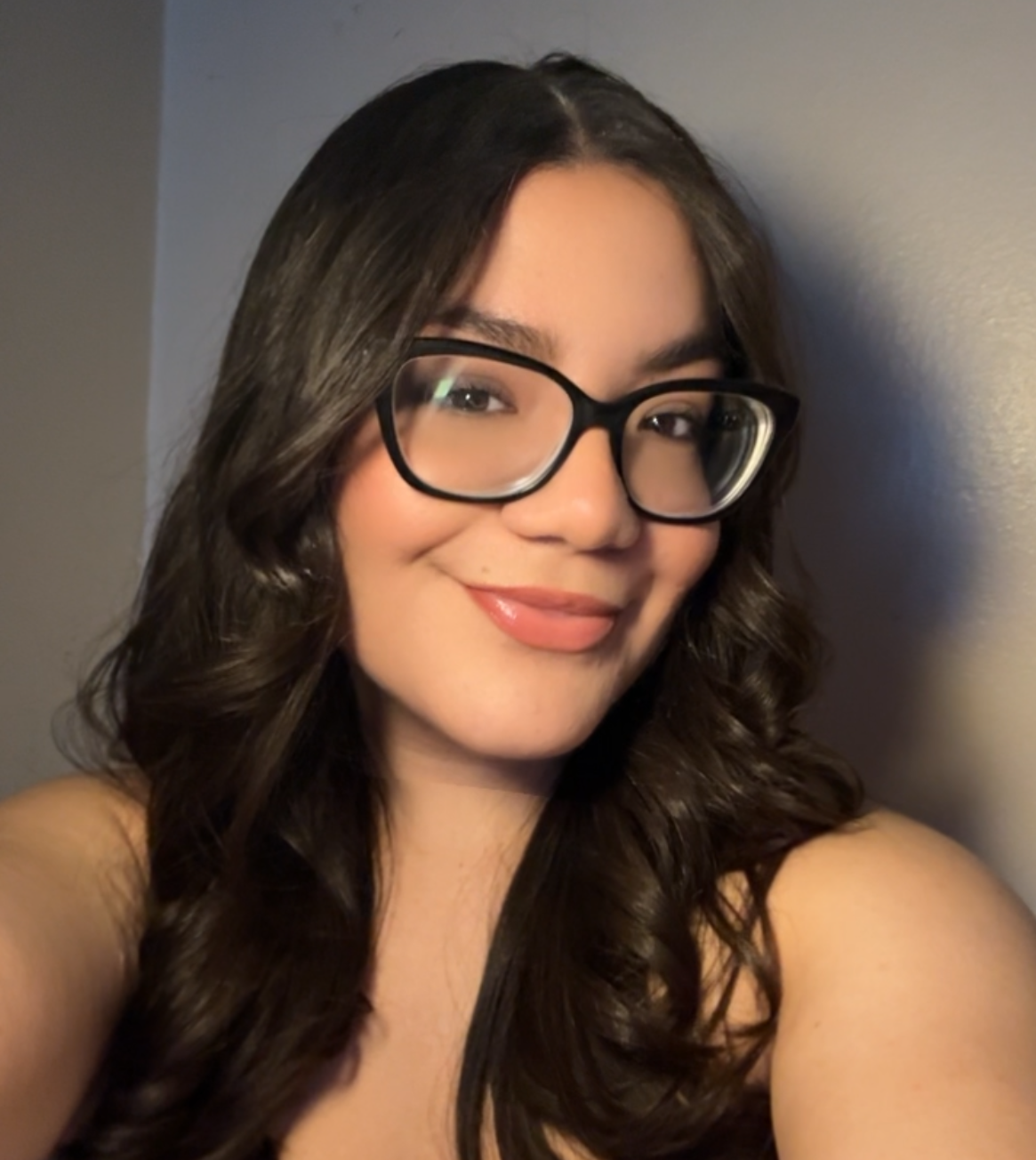
Writer | Tweet me @brittanyskylerr

